 Saint Cyril, Archbishop of Alexandria, a distinguished champion of Orthodoxy and a great teacher of the Church, came from an illustrious and pious Christian family. He studied the secular sciences, including philosophy, but most of all he strove to acquire knowledge of the Holy Scriptures and the truths of the Christian Faith. In his youth Cyril entered the monastery of Macarius in the Nitreia hills, where he stayed for six years. Theophilus (385-412), the Patriarch of Alexandria, ordained him as a deacon, numbered him among the clergy and entrusted him to preach.
Saint Cyril, Archbishop of Alexandria, a distinguished champion of Orthodoxy and a great teacher of the Church, came from an illustrious and pious Christian family. He studied the secular sciences, including philosophy, but most of all he strove to acquire knowledge of the Holy Scriptures and the truths of the Christian Faith. In his youth Cyril entered the monastery of Macarius in the Nitreia hills, where he stayed for six years. Theophilus (385-412), the Patriarch of Alexandria, ordained him as a deacon, numbered him among the clergy and entrusted him to preach.
Upon the death of Patriarch Theophilus, Cyril was unanimously chosen to the patriarchal throne of the Alexandrian Church. He led the struggle against the spread of the Novatian heresy in Alexandria, which taught that any Christian who had fallen away from the Church during a time of persecution, could not be received back into it.
Cyril, seeing the futility of admonishing the heretics, sought their expulsion from Alexandria. The Jews appeared a greater danger for the Church, repeatedly causing riots, accompanied by the brutal killing of Christians. The saint long contended with them. In order to wipe out the remnants of paganism, the saint cast out devils from an ancient pagan temple and built a church on the spot, and the relics of the Holy Unmercenaries Cyrus and John were transferred into it. A more difficult struggle awaited the saint with the emergence of the Nestorian heresy.
Nestorius, a presbyter of the Antiochian Church, was chosen in 428 to the see of Constantinople and there he was able to spread his heretical teaching against the dogma about the uncommingled union of two natures in the Person of the Lord Jesus Christ. Nestorius called the Mother of God not the Theotokos, but rather Christotokos or “Birth-giver of Christ,” implying that she gave birth not to God, but only to the man Christ. The holy Patriarch Cyril repeatedly wrote to Nestorius and pointed out his error, but Nestorius continued to persevere in it. Then the saint sent out epistles against Nestorianism to the clergy of Constantinople and to the holy emperor Theodosius the Younger (408-450), denouncing the heresy. Cyril wrote also to other Churches, to Pope Celestine and to the other Patriarchs, and even to monks of several monasteries, warning of the emergence of a dangerous heresy.
Nestorius started an open persecution against the Orthodox. In his presence one of his partisans, Bishop Dorotheus, pronounced an anathema against anyone who would call the Most Holy Virgin Mary the Theotokos.
Nestorius hated Cyril and brought out against him every kind of slander and fabrication, calling him a heretic. The saint continued to defend Orthodoxy with all his powers. The situation became so aggravated, that it became necessary to call an Ecumenical Council, which convened in the city of Ephesus in the year 431. At the Council 200 bishops arrived from all the Christian Churches. Nestorius, awaiting the arrival of Bishop John of Antioch and other Syrian bishops, did not agree to the opening of the Council. But the Fathers of the Council began the sessions with Cyril presiding. Having examined the teaching of Nestorius, the Council condemned him as a heretic. Nestorius did not submit to the Council, and Bishop John opened a “robber council”, which decreed Cyril a heretic. The unrest increased. By order of the emperor, Patriarch Cyril of Alexandria and Archbishop Memnon of Ephesus were locked in prison, and Nestorius was deposed.
Soon Saints Cyril and Memnon were freed, and the sessions of the Council continued. Nestorius, not submitting himself to the determinations of the Council, was deprived of priestly rank. By order of the emperor he was sent to the faraway place Sasim in the Libyan wilderness, where he died in grievous torments. His tongue, having blasphemed the Mother of God, was overtaken by punishment — in it there developed worms. Even Bishop John of Antioch and the remaining Syrian bishops signed the decrees of the Council of Ephesus.
Cyril guided the Alexandrian Church for 32 years, and towards the end of his life the flock was cleansed of heretics. Gently and cautiously Cyril approached anyone, who by their own simpleness and lack of knowledge, fell into false wisdom. There was a certain Elder, an ascetic of profound life, who incorrectly considered the Old Testament Priest Melchizedek to be the Son of God. Cyril prayed for the Lord to reveal to the Elder the correct way to view the righteous one. After three days the Elder came to Cyril and said that the Lord had revealed to him that Melchizedek was a mere man.
Cyril learned to overcome his prejudice against the memory of the great John Chrysostom (November 13). Theophilus, the Patriarch of Alexandria, and uncle of Cyril, was an antagonist of John, and presided in a council in judgment of him. Cyril thus found himself in a circle antagonistic to John Chrysostom, and involuntarily acquired a prejudice against him. Isidore of Pelusium (February 4) repeatedly wrote to Cyril and urged him to include the name of the great Father of the Church into the diptychs of the saints, but Cyril would not agree.
Once in a dream he saw a wondrous temple, in which the Mother of God was surrounded by a host of angels and saints, in whose number was John Chrysostom. When Cyril wanted to approach the All-Holy Lady and venerate her, John Chrysostom would not let him. The Theotokos asked John to forgive Cyril for having sinned against him through ignorance. Seeing that John hesitated, the Mother of God said, “Forgive him for my sake, since he has labored much for my honor, and has glorified me among the people calling me Theotokos.” John answered, “By your intercession, Lady, I do forgive him,” and then he embraced Cyril with love.
Cyril repented that he had maintained anger against the great saint of God. Having convened all the Egyptian bishops, he celebrated a solemn feast in honor of John Chrysostom.
Cyril died in the year 444, leaving behind many works. In particular, the following ought to be mentioned: commentaries On the Gospel of Luke, On the Gospel of John, On the Epistles of the Apostle Paul to the Corinthians and to the Hebrews; also an Apologia in Defense of Christianity against the Emperor Julian the Apostate (361-363). Of vast significance are his Five Books against Nestorius; a work on the Most Holy Trinity under the title Thesaurus, written against Arius and Eunomios. Also two dogmatic compositions on the Most Holy Trinity, distinguished by a precise exposition of the Orthodox teaching on the Procession of the Holy Spirit. Cyril wrote Against Anthropomorphism for several Egyptians, who through ignorance depicted God in human form. Among Cyril’s works are also the Discussions, among which is the moving and edifying Discourse on the Exodus of the Soul, inserted in the Slavonic “Following Psalter”.
Today we commemorate the repose of this great Father of the Church. He is also remembered on January 18, the date of his flight from Alexandria.
Source: www.oca.org
The canon of the saint, the acrostic whereof is: “Cyril is the harp of divine visions”, the composition of Theophanes, in Tone IV.
Ode I, Irmos: Having traversed the depths of the Red Sea with dryshod feet, Israel of old vanquished the might of Amalek in the wilderness by Moses’ arms stretched out in the form of the Cross.
Hierarch of Christ, Cyril, pray to God for us.
Receiving light-giving grace from God, O Cyril, and revealed as a radiant beacon, thou hast shone forth upon the rays of the Word by thy commemoration, that we may hymn thee as is meet.
Hierarch of Christ, Cyril, pray to God for us.
As a keeper of the commandments of Christ thou wast full of the effulgence of the Spirit, O all-wise Cyril, having been cleansed of the passions; and thou truly becamest a dwelling-place of the all-divine Trinity.
Glory be to the Father, and to the Son, and to the Holy Spirit,
As one full of zeal and boldness, O glorious Cyril, contending for the right Faith thou hast truly denounced the God-opposing blasphemies of ungodly heresies.
Now and ever, and unto the ages of ages. Amen.
Theotokion: In giving birth to the Creator of all Who hath lifted us up who have been laid low by the fall of our first father, O most immaculate Bride of God, thou hast healed the broken state of mankind.
Ode III, Irmos: Thy Church rejoiceth in Thee, O Christ, crying aloud: Thou art my strength, O Lord, my refuge and my consolation!
Hierarch of Christ, Cyril, pray to God for us.
Strengthened in Christ, O Cyril, with steadfast mind thou didst destroy the wiles of the evil serpent like a spider’s web.
Hierarch of Christ, Cyril, pray to God for us.
Thou didst shake off the mire of the passions from thy soul, O Cyril, and cast down the uprising of every thought which exalteth itself against Christ.
Glory be to the Father, and to the Son, and to the Holy Spirit.
As a successful athlete, O father, thou didst steadily turn away from every carnal pleasure as harmful and detrimental.
Now and ever, and unto the ages of ages. Amen.
With joy we all splendidly glorify thee as the only blessed one among women who became the habitation of God.
Lord, have mercy. Lord, have mercy. Lord, have mercy.
Sessional hymn, Tone III, Spec. Mel. “Awed by the beauty of thy virginity…”: As a pillar and sacrifice of the Church of Christ, O father, thou didst preserve it unshaken by the temptations of the evil one, and all-wise; for thou didst destroy all the evil works of Nestorius and didst proclaim the Mother of God to be the Theotokos. Wherefore, assembling, we honor thee, O divinely blessed Cyril.
Glory be to the Father, and to the Son, and to the Holy Spirit; now and ever, and unto the ages of ages. Amen.
Theotokion: As an uncultivated vine, O Virgin, thou didst put forth the most comely Cluster Who poureth forth upon us the wine of salvation which maketh glad men’s souls and bodies. Wherefore, ever blessing thee as the cause of good things, we cry out to thee with the angels: Rejoice, O thou who art full of grace!
Stavrotheotokion (replaces the Theotokion on Wednesdays and Fridays): Thy pure Mother who knew not wedlock, beholding Thee, O Christ, hanging dead upon the Cross, said, lamenting maternally: “How hath the iniquitous and ungrateful assembly of the Jews rewarded Thee, which enjoyed Thy many and great gifts, O my Son? I hymn Thy divine condescension.”
Ode IV, Irmos: Beholding Thee lifted up upon the Cross, O Sun of righteousness, the Church stood rooted in place, crying out as is meet: Glory to Thy power, O Lord!
Hierarch of Christ, Cyril, pray to God for us.
Seeing thee, O God-bearing father Cyril, who vanquished the soul-corrupting passions and restrained carnal thoughts, Christ set thee as a primate of His divine Church.
Hierarch of Christ, Cyril, pray to God for us.
Inheriting the paternal virtue of Mark as a beloved son, thou wast an inheritor of his divine throne, following in the footsteps of the evangelist.
Glory be to the Father, and to the Son, and to the Holy Spirit.
Tended by Christ like a lamb, O father, like a shepherd thou didst pasture thy flock on thy spiritually nourishing discourses, feeding them grace as though it were grass and flowers.
Now and ever, and unto the ages of ages. Amen.
Giving birth to the incarnate Word of God Who before was incorporeal, O most hymned and joyous one, thou hast restored the world. Wherefore, O Bride of God, with Orthodox faith we proclaim thee.
Ode V, Irmos: Thou hast come, O my Lord, as a light into the world: a holy light turning from the darkness of ignorance those who hymn Thee with faith.
Hierarch of Christ, Cyril, pray to God for us.
Thy discourse, O Cyril, was like unto a mighty torrent which floodeth rivers, scouring away the craftiness of the heretics.
Hierarch of Christ, Cyril, pray to God for us.
The vile division of Arius and the abominable confusion of Sabellius didst thou equally consign to the abyss, O Cyril.
Glory be to the Father, and to the Son, and to the Holy Spirit.
O Cyril, thou hast left to the Church of Christ thine enriching discourses like gold and thy treasuries like precious stones.
Now and ever, and unto the ages of ages. Amen.
Let heaven drop down gladness and grace upon the earth, for it now sendeth up gladness on high, the only Mother of God.
Ode VI, Irmos: I will sacrifice to Thee with a voice of praise, O Lord, the Church crieth unto Thee, cleansed of the blood of demons by the blood which, for mercy’s sake, flowed from Thy side.
Hierarch of Christ, Cyril, pray to God for us.
With tongs the seraph gave the prophet a burning coal, and by thy hands, O initiate of sacred mysteries, thou givest to the Church of Christ a purifying coal from the divine Fire.
Hierarch of Christ, Cyril, pray to God for us.
Thou didst not destroy Philistines like Samson, but didst cast down all the alien doctrines of the heterodox and hast given might to the Orthodox, O Cyril.
Glory be to the Father, and to the Son, and to the Holy Spirit.
Manifestly heading the divinely elect council, O father, thou didst cast down the ungodliness of Nestorius and his Christ-opposing audacity, O father, breathing forth with zeal for the true Mother of God.
Now and ever, and unto the ages of ages. Amen.
Thou didst bud forth the Fruit of incorrupt understanding, O Theotokos, being shown forth to the world as an ever-living mediator of incorruption for those who hymn thee with faith and love.
Lord, have mercy. Lord, have mercy. Lord, have mercy.
Glory be to the Father, and to the Son, and to the Holy Spirit; now and ever, and unto the ages of ages. Amen.
Kontakion, Tone VI, Spec. Mel. “Fulfilling the dispensation concerning us…” : Thou hast manifestly poured forth upon us an abyss of doctrines of theology from the wellsprings of the Savior, drowning heresies and saving thy flock unharmed by threefold waves, O blessed Cyril; for thou art shown to be a guide for all lands, O venerable one, revealing things divine.
Ikos: When the great, beauteous and radiant sun showeth itself at dawn, darkness is driven away and the moon retreateth, for night cannot abide it: it shineth forth with the light of day, illumineth the air, showeth forth the sky as beautiful for us, adorning the earth and causing plants to grow; it maketh bright the sea and also adorneth the whole world. Alike in all is the most radiant Cyril, whose wise teachings save the world. For he illumineth the souls of the faithful therewith and ever vanquisheth heresies with piety; for he is the guide for all lands, revealing things divine.
Ode VII, Irmos: The children of Abraham in the Persian furnace, afire with love of piety more than with the flame, cried out: Blessed art Thou in the temple of Thy glory, O Lord!
Hierarch of Christ, Cyril, pray to God for us.
Moses of old, entering the darkness on Mount Sinai, received the law which slayeth by the letter; but thou, O blessed Cyril, hast disclosed the hidden beauty of the Spirit.
Hierarch of Christ, Cyril, pray to God for us.
As revelation was made to the children of old in the indistinct images of the law, O father, thou didst lift the lid from the cup given thee, opening it like a rose of understanding, most manifestly speaking in images.
Glory be to the Father, and to the Son, and to the Holy Spirit.
Theologizing the three Hypostases in unconfused divine unity and manifestly indivisible distinction, O father Cyril, thou didst utter immutable truths concerning the one Essence and Godhead.
Now and ever, and unto the ages of ages. Amen.
The angels beheld strange things in thy birthgiving, O Mother of God: the corrupt nature of the earthly race hastening toward the life of incorruption and the glory of heaven.
Ode VIII, Irmos: Stretching forth his hands, Daniel shut the lions’ mouths in the pit; and the young lovers of piety, girded about with virtue, quenched the power of the fire, crying out: Bless the Lord, all ye works of the Lord!
Hierarch of Christ, Cyril, pray to God for us.
Like a wave of the sea did the wellspring of wisdom truly flow forth in thee; for ever-flowing rivers of the doctrines of piety issued forth from within thee, as Christ foretold, O father; for thy divinely chosen words surpass the sands.
Hierarch of Christ, Cyril, pray to God for us.
Thou wast a wise pastor and teacher of the Church, O venerable Cyril, manifestly interpreting both covenants; for, possessing thy discourses as an anchor and a paternal inheritance, it crieth out: Bless the Lord, all ye works of the Lord!
Glory be to the Father, and to the Son, and to the Holy Spirit.
Thou teachest the ineffable union of the Word, the Fashioner of all, Who became incarnate for our sake, which is indivisible and unconfused, O Cyril, and didst incline towards an individual will for each nature, crying: Bless the Lord, all ye works of the Lord!
Now and ever, and unto the ages of ages. Amen.
The Son and Word of God Who is wholly unapproachable in His essence, made His abode within thee, O pure, all-pure one, and, clothing Himself in our essence, in that He is merciful, He appeared accessible in the flesh and dwelt with us who cry aloud: Bless the Lord, all ye works of the Lord!
Ode IX, Irmos: Eve, through weakness, abode under the curse of disobedience; but thou, O Virgin Theotokos, hast put forth blessing for the world through the Offspring of thy child-bearing. Wherefore, we all magnify thee.
Hierarch of Christ, Cyril, pray to God for us.
O Cyril, thou didst cast down the disdain directed against the understanding of Christ and His divine Mother, and all the might of the ungodly Nestorius, the dual sonship, and the mingling of essences of the Acephaloi.
Hierarch of Christ, Cyril, pray to God for us.
With the power of understanding and the enlightenment of grace, O blessed one, thou didst theologize concerning the consubstantial Trinity and the incarnate Word of God; and showing thyself to be champion of the Theotokos, thou art now glorified in the highest.
Glory be to the Father, and to the Son, and to the Holy Spirit.
O ever-memorable father, thou dost mercifully look down from on high upon us who hymn thee, granting victory over all heresies to our right-believing hierarchs, by thy supplications lifting up the horn of the Orthodox, and illumining those who magnify thy memory.
Now and ever, and unto the ages of ages. Amen.
Beset by many falls and the cruelty of misfortunes, O all-hymned one, I now offer thee a sacrifice of praise and earnestly cry out to thee: O holy Theotokos, help me, for I finish my hymnody glorifying thee.

Troparion, Tone VIII: O instructor of Orthodoxy, teacher of piety and purity, beacon of all the world, divinely inspired adornment of hierarchs: O all-wise Cyril, by thy doctrines thou hast enlightened all. O harp of the Spirit, entreat Christ God, that our souls be saved.
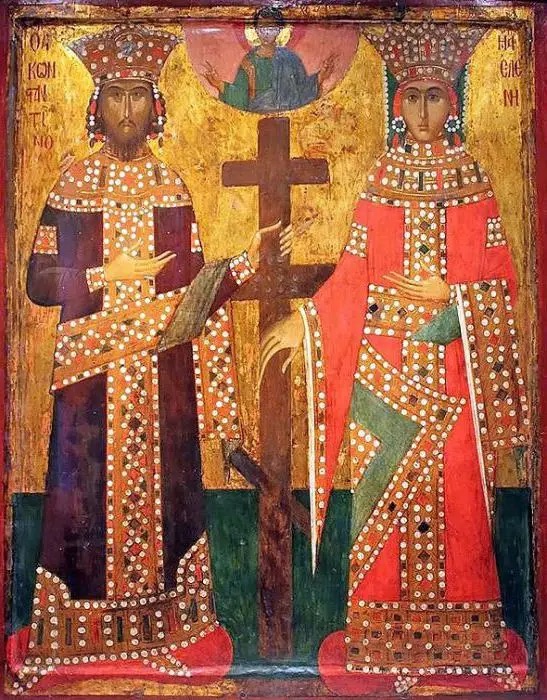
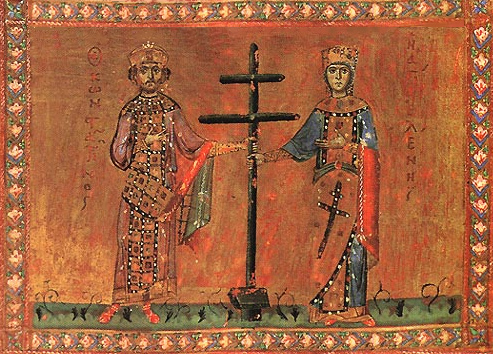
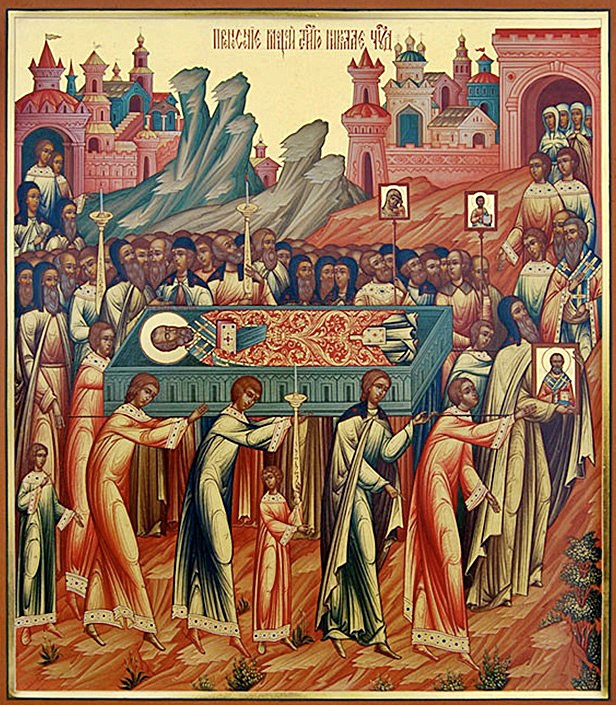
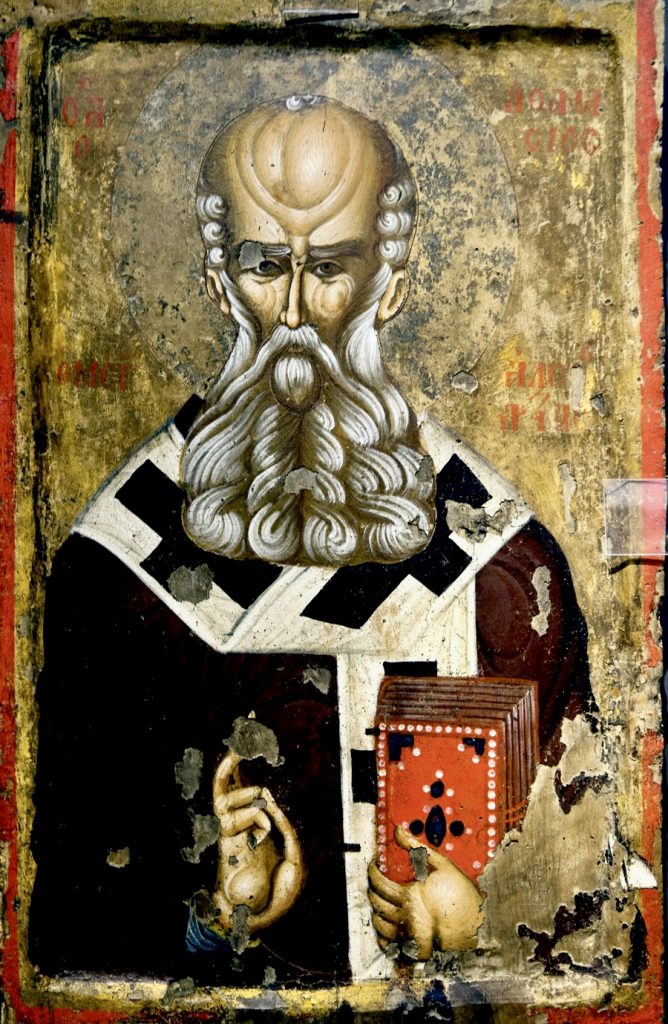

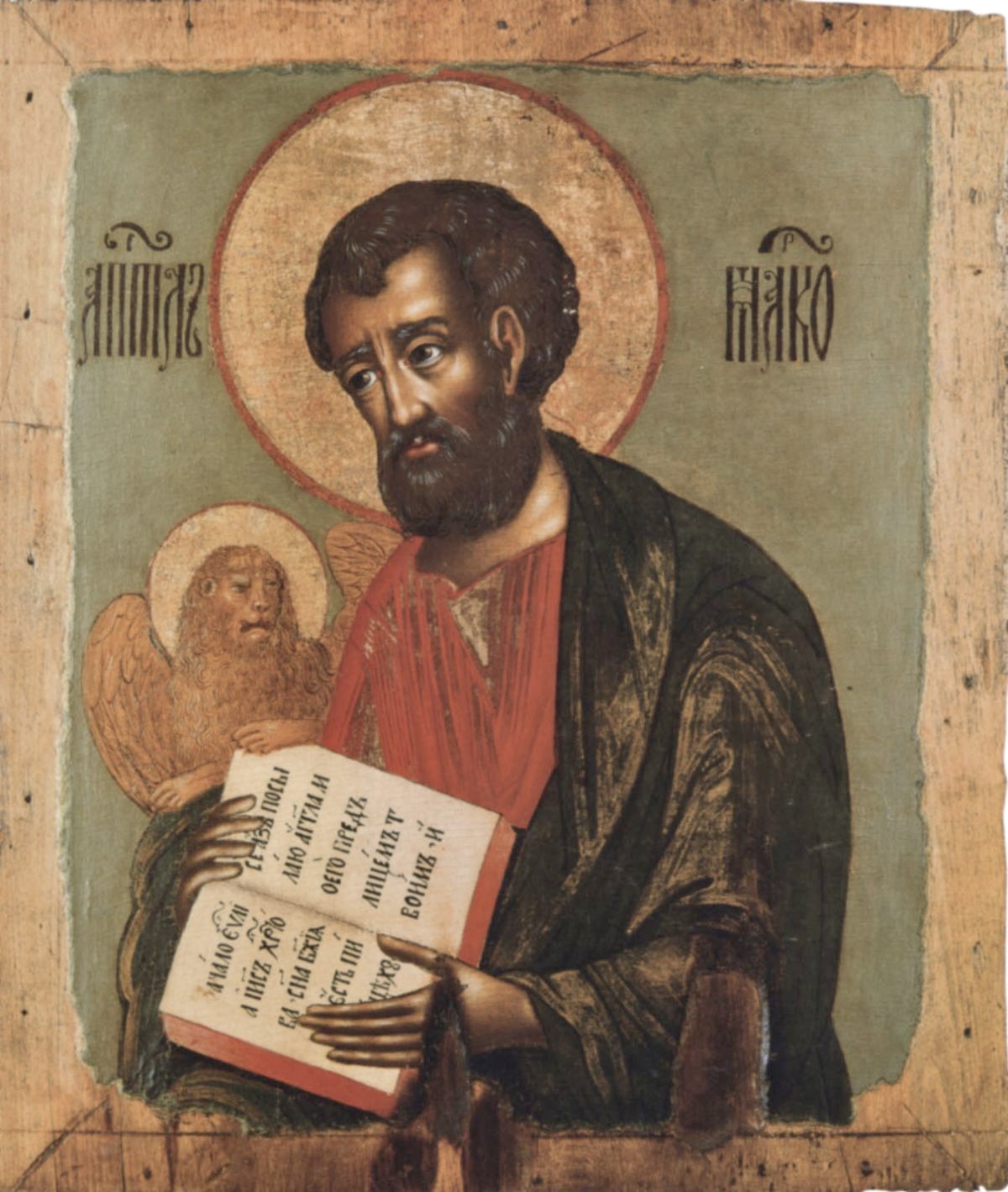


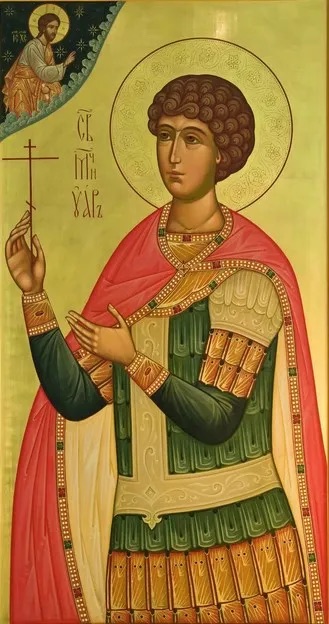 It happened that there were seven teachers of the Christians, desert-dwellers, that were brought before the Prince of Egypt.
It happened that there were seven teachers of the Christians, desert-dwellers, that were brought before the Prince of Egypt.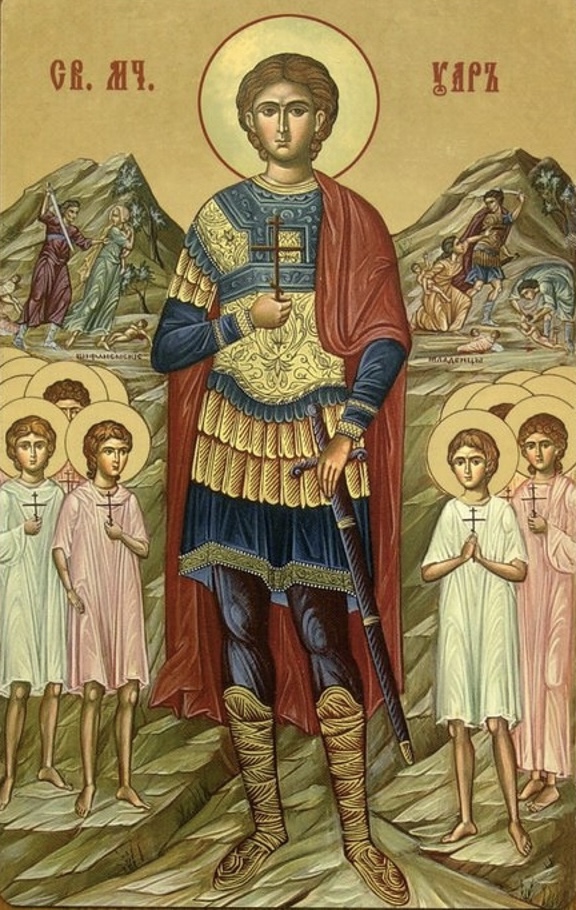
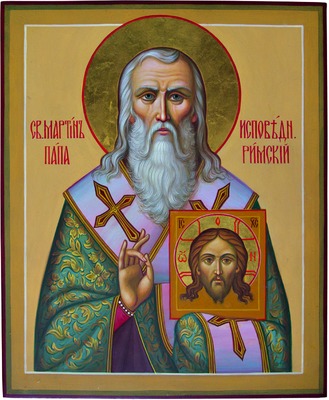 At this time the peace of the Church was disturbed by the Monothelite heresy (the false doctrine that in Christ there is only one will. He has a divine, and a human will). The endless disputes of the Monothelites with the Orthodox took place in all levels of the population. Even the emperor Constans (641-668) and Patriarch Paul of Constantinople (641-654) were adherents of the Monothelite heresy. The emperor Constans II published the heretical “Pattern of Faith” (Typos), obligatory for all the population. In it all further disputes were forbidden.
At this time the peace of the Church was disturbed by the Monothelite heresy (the false doctrine that in Christ there is only one will. He has a divine, and a human will). The endless disputes of the Monothelites with the Orthodox took place in all levels of the population. Even the emperor Constans (641-668) and Patriarch Paul of Constantinople (641-654) were adherents of the Monothelite heresy. The emperor Constans II published the heretical “Pattern of Faith” (Typos), obligatory for all the population. In it all further disputes were forbidden.